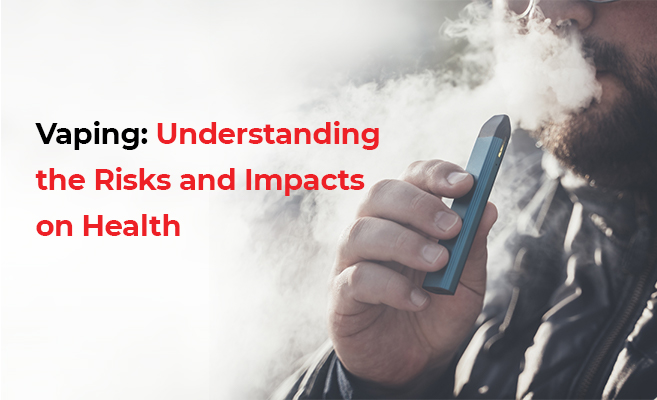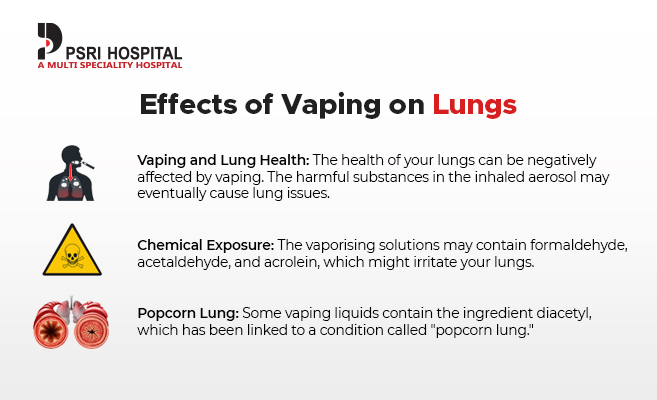Vaping: Understanding the Risks and Impacts on Health

Have you ever wondered about the buzz around vaping? Are you curious about what really happens to your body when you vape? Well, you arrived at the right place.
Vaping has become a popular trend among many people, especially young adults. It’s essential to know the potential risks and impacts it can have on your health. In this blog, we’ll break down the effects of vaping on lungs, whether vaping causes cancer and the side effects you should be aware of.
Effects of Vaping on Lungs

Vaping and Lung Health:
The health of your lungs can be negatively affected by vaping. The harmful substances in the inhaled aerosol may eventually cause lung issues. While vaping does not involve burning tobacco the way traditional cigarettes do, it’s still not completely risk-free.
Chemical Exposure:
The vaporising solutions may contain formaldehyde, acetaldehyde, and acrolein, which might irritate your lungs. Chronic bronchitis or even more serious lung diseases may result from these irritants.
Popcorn Lung:
Some vaping liquids contain the ingredient diacetyl, which has been linked to a condition called “popcorn lung.” This condition can damage your lungs’ tiny airways, causing coughing and shortness of breath.
Does Vaping Cause Cancer?
The Risk of Cancer:
Vaping does not completely eliminate the danger of developing cancer, even though it may not expose you to the same toxins as regular tobacco smoke. According to certain research, vaping may cause alterations in lung cells that may eventually raise the risk of developing cancer. To fully understand the long-term impacts, more study is necessary.
Nicotine and Cancer:
The extremely addictive chemical nicotine is present in many vaping liquids, and it has been linked to cancer. Although it isn’t a direct cause of cancer of liver, lungs etc, it can raise your risk by encouraging the growth of cancer cells that already exist.
Side Effects of Vaping
Nicotine Addiction:
One of the most common side effects of vaping is nicotine addiction. Many people who start vaping to quit smoking end up becoming addicted to nicotine all over again. Nicotine addiction can lead to cravings, irritability, and even withdrawal symptoms when trying to quit.
Respiratory Issues:
Vaping can result in short-term respiratory problems in addition to long-term lung damage. Shortness of breath, wheezing, and coughing are some of the symptoms that can result. For people who already have respiratory diseases like asthma, these symptoms can be very troublesome.
Heart Problems:
Vaping can have a negative impact on the health of your heart. The nicotine in e-cigarettes can raise blood pressure and heart rate, which may cause cardiac challenges, especially in people who already have cardiovascular problems.
Mental Health Concerns:
Some studies have suggested a link between vaping and mental health issues, such as depression and anxiety. However, more research is needed to establish a clear connection.
Conclusion
In conclusion, using a vape pen involves some danger. It may have a negative impact on your lungs, raise your chance of cancer, and cause a number of side effects, such as nicotine addiction, respiratory disorders, heart problems, and perhaps even mental health issues. If you are considering vaping or trying to quit smoking, it’s essential to seek support and guidance from the best pulmonologist in Delhi NCR. They can provide you with information and resources to help you make informed choices about your health. So, if you are looking for the best multispeciality hospital in Delhi, go no further than PSRI Hospital. We have a team of the best pulmonologist in Delhi NCR who can help you give the right treatment to your vaping-related issues.
FAQs
Q 1: Is vaping safer than smoking traditional cigarettes?
Answer: Since vaping does not involve burning tobacco, which creates numerous hazardous chemicals, it is frequently thought to be less toxic than traditional smoking. It’s not completely safe, though. Vaping still exposes you to potentially dangerous chemicals and can be damaging to your health, particularly to the condition of your lungs.
Q 2: Can vaping cause lung problems?
Yes, vaping can lead to lung issues. Inflammatory and toxic compounds may be present in the vaping aerosol, which can cause lung conditions, including chronic bronchitis. Some of the chemicals in vaping liquids can also harm the tiny airways in your lungs, leading to illnesses like “popcorn lung.”
Q 3: Does vaping lead to nicotine addiction?
Answer: Yes, vaping can lead to nicotine addiction. Many e-cigarettes contain nicotine, a highly addictive substance. People who start vaping may become addicted to nicotine, experiencing cravings and withdrawal symptoms when trying to quit, similar to traditional cigarette smokers.
Q 4: Is there a risk of cancer from vaping?
Answer: While vaping may expose you to fewer carcinogens compared to traditional smoking, it’s not entirely risk-free. Some studies suggest that vaping can lead to changes in lung cells that may increase the risk of cancer over time. However, more research is needed to understand the long-term effects on cancer risk fully.
Q 5: What are the common short-term side effects of vaping?
Answer: Common short-term side effects of vaping include coughing, wheezing, and shortness of breath. The nicotine in e-cigarettes can also increase your heart rate and blood pressure, potentially leading to heart problems. It’s essential to be aware of these side effects if you decide to try vaping.

 Book An Appointment
Book An Appointment Virtual Consultation
Virtual Consultation




